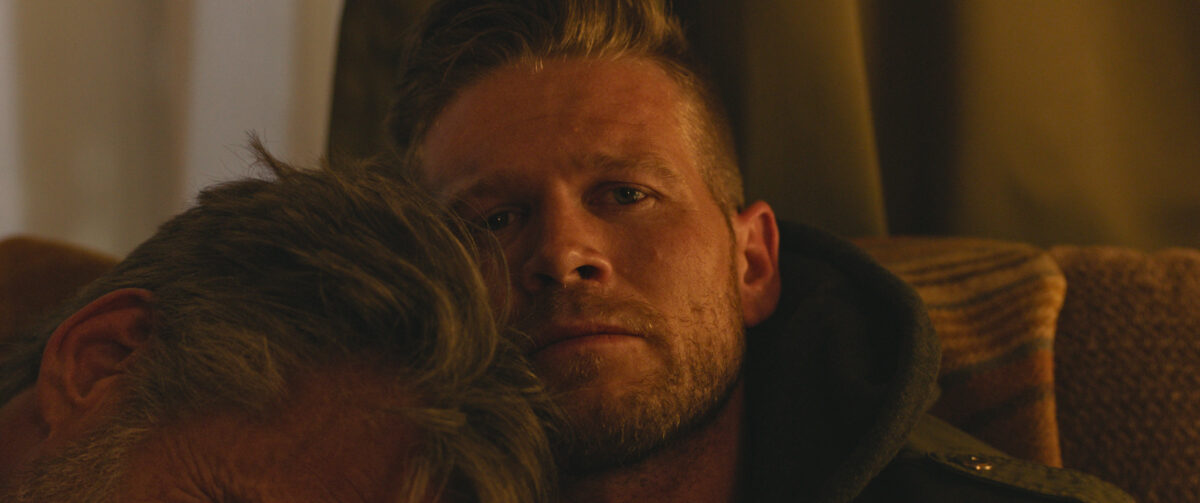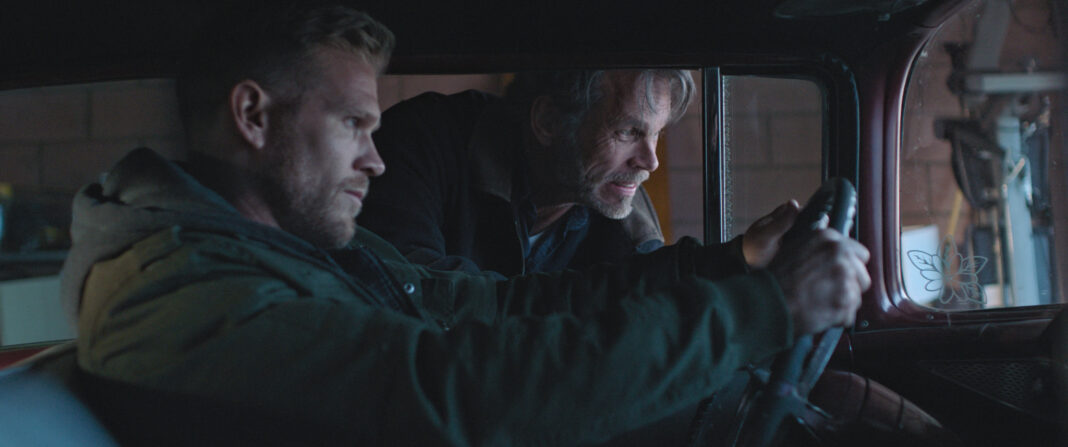British/Israeli film-maker Roy Arwas focuses on the uncertain bond between a father affected by Alzheimer’s and a son back from the military affected by his father’s behaviour towards him as a child in the acclaimed new short CLARITY.
Film And TV Now recently spoke with the film-maker about the issues and the process making the film:

FILM AND TV NOW: Two issues dominate this film – the effect of Alzheimer’s and past abuse, both have direct and indirect effects on each other. Which one was the start-off point for the script?
ROY ARWAS: The start off of this film was definitely linked to the phrase “forgive and forget.” When writing the script, we wanted to explore a story where a character had to forgive, because the other character forgot. Alzheimer’s and the abuse were definitely the vehicles that allowed us to plunge into the theme of the film.
FTVN: Were the characters based on anyone in particular?
RA: Not really. I really leaned into what the story called for, and wrote the characters based on that. Although there were elements that I based off of personal experience, or aspects of my life, the characters were definitely fictional.
FTVN: What is interesting is you use a very wide open and rural space as a contrast to the emotional prison the father is contained in. Was this a deliberate visual choice?
RA: Wow! I am so happy you caught that. That was definitely something we thought about when writing the story, but really saw it as a metaphor that probably no one would catch. So it’s awesome to hear you noticed it!
We definitely wanted the open space to contrast the cluttered, and almost prison like world the father is in emotionally. However, we saw Tom as the true emotional prisoner—one that locked himself up with rage and resentment towards his father. Going back home, and re-entering this rural space was the key to forgiving and letting himself free of that pain.
FTVN: Tell us about your cast.
RA: Brett Zimmerman is a very close friend of mine, and I wrote it with him in mind. Strangely enough, right after I finished the first draft, I watched a film of his that had just come out on Netflix. Chris Browning, who plays his father in Clarity, was in the Netflix film with Brett.
My producer and I were watching it, looked at each other and paused the film. Their resemblance and their chemistry was perfect. We somehow convinced Chris to jump on board, and the rest was history. Jodi Moore Lewis, who plays Tom’s sister, is also a good friend of ours, and was just perfect for the role. Destiny definitely played a huge role in this process.
FTVN: Tell us about your production team.
RA: Wow. Where do I even begin? My producers, Tiffany Kontoyiannis-Guillen and Karly Perez Arevalo, were one of the most important engines of the film.
They really have an eye for bringing incredible perspective, and constantly pushed the project further than I even thought was possible. They definitely set the tone for the standard we held throughout the process. They created the most warm, loving, and inspiring environment for our entire cast and crew to thrive in.
FTVN: You use some very interesting music cuts in the film. Tell us about the people you worked with.
RA: Jesper Ankarfeldt, our composer, is a pure genius. Working with him was such a joy, and honestly was one of the most exciting parts of the process! From the first day we met he truly had the vision this piece needed. He tied the setting of our film, mixed in with the thematic undertones of the story. It was important to allow the music to really be a character in the film, however, one that you felt instead of noticed.

FTVN: Tell us about your Cinematographer.
RA: Becky Baihui Chen, otherwise called (by us) “La Jefa.” She is in every sense of the word… a complete boss. She not only has impeccable taste, but she had a vision for this story that really elevated this project. She approached the cinematography with absolute care, and really helped bring the level of realism we strived to portray.
FTVN: Where did you shoot and for how long?
RA: Lancaster, CA – It was 6 days. We got to lodge at a little hotel around the beautiful place we filmed at.
FTVN: There is at least one very emotional scene we see between the father and son because of the past conflict in the family. Did you do much rehearsal with the actors or was a lot of it impromptu?
RA: That scene required a good amount of rehearsals. It was important for us to make sure we not only got the blocking down, but we were able to really bring out the emotional elements the scene called for. However, the wind that night was incredibly strong, and it was the coldest night Lancaster had scene that year.
We used that energy to elevate the scene, and our actors were able to incorporate all the challenges we faced into their performances. We ended up filming 3 takes per angle, we allowed the camera operator, Joshua Christales, to feel to mood and flow with the actors so it allowed us to play with the shots in post.
FTVN: Tom is a traditional Marine home from service after a decade. What fascinates you about military symbolism as a whole?
RA: Coming from an Israeli background, we (both men and women) are raised with the one fact that we will serve in the army as soon as we graduate high school. The military for me has always had the symbolism of heroism, of patriotism, and of discipline.
However, in this film, Tom really used the military as a way to escape his home, and as an attempt to numb the pain he felt from his past. The war inside him was far scarier than any war he could face outside. Somehow, even after years serving his country, the biggest wound he carried was one his father gave him all those years ago.
FTVN: Your production company, Gearmark Pictures, does a lot of online YouTube. Tell us a bit more about that side of your endeavours and do you have any advice for people who are looking to create their own legacy and portfolio of work?
RA: Years ago I formed Gearmark Pictures with five talented film-makers, all who are masters of their own craft. Together we created engaging content that I hold dear to my heart to this day. Although I decided to venture off and start a new company, which I have today, I truly appreciate that time with people I still call my close friends.
My current company, Creative X Entertainment, which I own with my amazing fiancé and producing/writing partner, is truly geared towards telling socially conscious stories, while also providing engaging content for all platforms.
As far as creating your own legacy, I would say find your tribe. Perhaps the only thing more important than telling a story you are passionate about, is telling it with people who believe and will fight for the same cause. You are only as good as those who you surround yourself with.
FTVN: You have also worked in the Music Video sector for a lot of notable named artists, including artists such as Wiz Khalifa, Tyga, and Hopsin. How does working with somebody like that shape your own endeavours, given that film and music are interchangeable and influential of the other these days?
RA: Music videos are very much a breed of their own. From having extremely tight deadlines, to facing a new obstacle every second on set, I feel like these projects keep me on my feet and exercise a muscle that think is pivotal for film-making.
It really pushes me to become a better and faster problem solver, and I truly enjoy the challenge that comes with it. Not to mention, the people I get to work with are really cool, so that’s a definite added bonus.

FTVN: You are of British/Israeli background. What would you say are the key influences of the two cultures that help define you as a film-maker and an individual?
RA: Both cultures have definitely impacted me in different ways. The biggest impact I’ve felt, especially leaving my country at a younger age, has really come from being an immigrant in another country. I’ve always kind of felt like a fish out of water. My roots have been scattered equally between the two of these wonderful homes, but it definitely can be hard as immigrant trying to assimilate to a new culture. This feeling of being somewhat out of place really inspires the characters I write, and almost always is a subliminal theme of my stories.
FTVN: Your Producer Tiffany Kontoyiannis-Guillen is a very active and prominent figure in production, covering a variety of important social topics including anti-bullying, which could be a real strength of CLARITY. Tell us more about her contribution to the short.
RA: Tiffany is the light to everything I’ve ever been a part of. She has a way with words that a person like me would only wish to portray. Tiffany, who is also my fiancé, is the reason Clarity is what it is. She really has pushed me to tell stories that matter—ones that would inspire change and evoke discussion. She played a huge role in the writing process of Clarity, and really brought her passion to elevate the piece. She’s my rock. The ying to my yang.
FTVN: Obviously with COVID-19 still causing much upheaval and re-evaluation of production techniques, how are you coping and creating during this unprecedented time?
RA: I am devastated to see how COVID-19 has affected our industry. I pray daily that it ends soon and that everyone comes out of it healthy and well. However, in the meantime, we are focusing on working on all the projects we never had time for previously. It has inspired a whole new evaluation of what’s to come, and honestly has been a really exciting time creatively speaking.
FTVN: Finally, what are you most proud of about the short?
RA: I am beyond proud of the team and family that came out of it. Right after filming, we took the same team to Ecuador to film Tiffany’s movie, Welcome Back, (which we were nominated for the College Television Awards for) and we continuously work together. So, I’m proud that with such a small team, we could make such a beautiful piece.





























